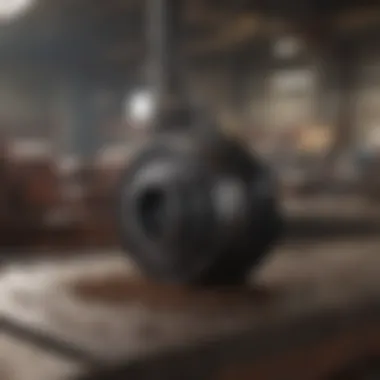Comprehensive Insights into Jenkins Iron and Steel


Intro
Jenkins Iron and Steel has established itself as a significant player in the agricultural sector by providing comprehensive solutions tailored to the needs of farmers and agricultural professionals. This article explores the operations and offerings of Jenkins Iron and Steel, aims to unpack how their products contribute to efficiency and sustainability in farming, and assesses their market positioning against competitors.
The focus will be on the intersection of innovative practices and the tangible impact these have on crop management and agricultural outcomes. By analyzing data garnered from various sources, including customer feedback and prevailing market trends, the following discussion will highlight the crucial role that quality materials play in modern agriculture.
Preamble to Jenkins Iron and Steel
The topic of Jenkins Iron and Steel carries great significance in discussions surrounding agricultural and industrial products. This company not only supplies vital materials for farming equipment but also plays a crucial role in the construction sector. Understanding the operations of Jenkins Iron and Steel helps stakeholders appreciate its influence on market conditions and practices.
In this section, we will explore essential facets of the company that showcase its commitment to quality and innovation. By highlighting relevant aspects, we aim to inform potential clients, industry analysts, and agricultural professionals about what Jenkins Iron and Steel has to offer.
Overview of the Company
Jenkins Iron and Steel has established itself as a reputable manufacturer of steel products tailored for agricultural machinery. Founded with a vision to enhance productivity in the farming sector, the company focuses on quality and durability. They produce a variety of equipment, ranging from tillage tools to advanced machinery for large-scale farms.
The company is located in a region known for its rich agricultural resources, which allows them to stay closely connected with their target audience. This connection fosters a deep understanding of the needs of farmers and the agricultural industry at large. Jenkins Iron and Steel prioritizes customer feedback and leverages this information to refine its product offerings continually.
Historical Context
Understanding the historical backdrop of Jenkins Iron and Steel reveals its evolution in response to changing market dynamics. Founded in the late 20th century, the company's inception came during a time when farming technologies were rapidly advancing. This historical context is essential to comprehend how Jenkins Iron and Steel positioned itself effectively.
Initially, the company focused on basic agricultural implements. However, as the demand for more sophisticated machinery grew, Jenkins adapted its manufacturing processes. By investing in modern technology and skilled labor, Jenkins Iron and Steel has expanded its product line while maintaining the essence of its original values. Today, they are recognized as a leader in the industry, offering innovative solutions that meet the diverse needs of contemporary agriculture.
Product Lines Offered
Understanding the product lines offered by Jenkins Iron and Steel is crucial in assessing the company's market relevance, specialized offerings, and the unique requirements it meets for its clients. The diverse range of products allows the company to cater to a wide segment of the agricultural and construction industries. By focusing on the specific needs of farmers and builders, Jenkins Iron and Steel has positioned itself as a reliable supplier in these sectors.
Farm Equipment
Categories of Equipment
The categories of farm equipment included in Jenkins Iron and Steel’s offerings cover essential machinery necessary for effective agricultural operations. These include but are not limited to plows, cultivators, seeders, and harvesters. Each piece of equipment is designed to enhance efficiency and productivity on farms.
Key characteristics of these categories include durability and ease of use. The materials and design ensure that these tools can withstand rigorous use in the field. This robustness makes them a popular choice among farmers who require reliable and long-lasting machinery. Additionally, a unique aspect of these categories is their adaptability to various farm sizes and types, which allows users to select equipment that fits their specific operational needs.
While the strengths of the equipment are clear, potential users should also consider the operating costs associated with maintenance or fuel. However, the overall investment is usually justified through increased productivity and efficiency, making these categories a strategic choice for users looking to maximize their output and reduce time spent on tasks.
Features and Benefits
Jenkins Iron and Steel’s farm equipment line is distinguished by several notable features that contribute positively to agricultural practices. One prominent feature is the incorporation of ergonomic designs, which aim to minimize strain during operation. This is increasing in importance as farmers seek to improve working conditions.
The benefits of these features extend beyond immediate usability. For example, the robust construction materials used ensures long-term performance, reducing downtime and maintenance costs. Farmers find value in this as it directly impacts their bottom line.
Moreover, the equipment is often equipped with modern technology, such as precision farming tools. These advancements help farmers optimize their operations through improved data collection and analysis. While there is an initial investment in higher-tech options, the long-term return on investment justifies the need for these tools in modern agriculture.
Construction Materials
Product Specifications


The product specifications of Jenkins Iron and Steel’s construction materials highlight essential qualities that align with stakeholder expectations. Items like beams, pipes, and sheets manufactured by the company are known for their strength and structural integrity. They meet rigorous industry standards, ensuring safety and dependability in use.
A key characteristic of these materials is their versatility. They can be utilized in various construction applications, from residential buildings to larger infrastructure projects. This adaptability is a significant advantage for builders who prefer to source from a supplier that can meet diverse needs.
Moreover, the unique features of these specifications include resistance to environmental deterioration, like rust and corrosion. This ensures longevity and lowers replacement costs. While the initial costs might be higher compared to lower-grade materials, the long-term savings make these specifications a wise investment.
Usage in Agriculture and Construction
The usage of Jenkins Iron and Steel’s construction materials in agriculture and construction presents a broad spectrum of applications. In agriculture, sturdy materials are required for building structures like barns, silos, and storage units. The reliability of these materials plays a significant role in protecting investments in equipment and goods.
In construction, the demand for resilience cannot be overstated. Contractors prioritize products that offer not only strength but also ease in handling and installation. The unique feature of these materials includes ease of customization, allowing for specific project requirements to be met without complications.
As for the benefits, the availability of high-quality construction materials helps ensure projects are completed on time and within budget. Although there may be variability in demand, the overall impact on both industries is significant. Stakeholders find confidence in utilizing products that are backed by a proven track record of success, aiding in the formulation of their project strategies.
"The combination of innovative practices and high-quality products positions Jenkins Iron and Steel as a leader in the market, fulfilling the evolving needs of farmers and construction professionals alike."
By emphasizing comprehensive product offerings, Jenkins Iron and Steel continues to enhance its reputation and market position, demonstrating the dual importance of quality and functionality.
Quality Assessment of Products
In the field of manufacturing, the quality of products can significantly affect the reputation of a company. For Jenkins Iron and Steel, the assessment of product quality is critical to maintaining trust with clients and ensuring long-term success. By focusing on specific elements, such as material sourcing and the manufacturing process, the company can optimize its products for performance and durability. This section will delve into the importance of quality assessment and how it can improve customer satisfaction and market share.
Material Sourcing
The process of material sourcing is foundational to ensuring high-quality products. Jenkins Iron and Steel carefully selects its materials from reputable suppliers known for their commitment to excellence. This results in raw materials that meet strict industry standards, thereby influencing the final output positively.
- Transparency: Sourcing from reliable suppliers allows for full traceability of materials, adding a layer of trust.
- Cost Efficiency: Quality materials can lead to fewer defects, reducing waste and ultimately saving costs.
Good sourcing also aligns with customer preferences for sustainable and ethical production practices. Consumers today are increasingly conscious of where their products come from, and Jenkins Iron and Steel meets this demand by prioritizing responsibly sourced materials.
Manufacturing Process
The manufacturing process at Jenkins Iron and Steel encompasses various stages designed to ensure that products meet high standards. The company adopts advanced techniques and technologies to enhance production efficiency while maintaining quality. Quality control measures play a significant role in this regard.
Quality Control Measures
Quality control measures are integrated into production at multiple levels. These measures actively monitor production to detect and resolve issues before products reach the market. Key characteristics include:
- Systematic Testing: Regular testing and inspections at each stage of the manufacturing process help identify potential faults.
- Employee Training: Continuous training programs ensure staff understand quality standards and manufacturing protocols.
These measures not only enhance product quality but also foster a culture of accountability among staff. Each employee becomes a guardian of quality, knowing that their efforts directly impact the end product. However, it is important to balance rigorous inspection with efficiency to avoid production delays.
Sustainability Practices
Sustainability practices are gaining traction in the industry, and Jenkins Iron and Steel is no exception. The company integrates eco-friendly measures in its manufacturing process. Key aspects of these practices include:
- Recycling Initiatives: Utilizing recycled materials reduces waste and conserves natural resources.
- Energy Efficiency: Implementing energy-efficient technologies cuts down on the carbon footprint associated with production.
While these practices provide clear advantages, such as improved public perception and compliance with environmental regulations, they may also involve higher initial investments. Nonetheless, this approach is widely seen as beneficial in the long run, allowing Jenkins Iron and Steel to position itself as a forward-thinking company committed to sustainable development.
"Investing in quality and sustainability is not merely a choice; it's an ethical imperative that leads to lasting rewards for both the business and its clients."


Customer Reviews and Feedback
Customer reviews and feedback serve as a crucial component in evaluating the operational success and market relevance of Jenkins Iron and Steel. These insights not only reflect customer satisfaction but also highlight areas where the company excels and where it could enhance its offerings. By analyzing feedback, stakeholders can gauge how well the products meet the needs of farmers and industry professionals. Understanding customer sentiment is vital in maintaining a competitive edge and driving continuous improvement in product quality and service delivery.
Analysis of Customer Sentiments
The analysis of customer sentiments provides a deep understanding of how products are perceived by users. This sentiment analysis can include positive feedback as well as critical evaluations. Customers often weigh in on factors such as durability, performance, and overall value. By aggregating this data, Jenkins Iron and Steel can identify trends and preferences, allowing for more informed decision-making in product development and marketing strategies.
Common Themes in Reviews
Positive Aspects
One notable aspect of customer feedback is the strong emphasis on the durability of Jenkins Iron and Steel's products. Users frequently highlight the robustness of the materials used, which contributes to a lower frequency of replacement and maintenance. This characteristic makes it a favorable option for many agricultural applications where reliability is paramount. Such durability leads to increased trust among users, who consider these products to be a solid investment for their operations.
Additionally, the customer support offered by Jenkins Iron and Steel has received commendation from several users. Timely responses and helpful solutions enhance customer experience and foster loyalty, which is critical for long-term success in the competitive market.
Areas for Improvement
While positive feedback is prevalent, areas for improvement also emerge from reviews. One recurring concern is the availability of product information. Some customers report difficulty in accessing detailed specifications or usage guidelines. This gap can hinder the purchasing process, as users may want to know more about the products before committing to a purchase. Addressing this issue would streamline the decision-making process and improve customer satisfaction.
Another aspect noted is the timeliness in delivery of products. While many customers express satisfaction with product performance, delays in shipping can lead to frustration. Ensuring a more reliable logistics process could significantly enhance the overall customer experience, making Jenkins Iron and Steel a more appealing choice in the eyes of potential buyers.
Market Positioning
Market positioning is crucial for understanding Jenkins Iron and Steel's place within the industry. It relates to how the company sets itself apart from competitors and how it resonates with its target audience. A strong market position can lead to greater brand recognition, loyalty, and ultimately increased sales.
Competitive Landscape
Key Competitors
In the context of Jenkins Iron and Steel, key competitors such as John Deere and Caterpillar are significant. These companies have established a reputation for high-quality, durable products. The main characteristic that makes these competitors popular is their broad range of products and established market presence. They offer diverse farming and construction equipment, which often appeals to potential customers looking for reliability.
A unique feature of these competitors is their extensive dealer networks, which ensure easier access to parts and service. This can be a double-edged sword. While it adds convenience for customers, it can also lead to price competition that may impact smaller players like Jenkins Iron and Steel. Understanding these dynamics is essential for analyzing the positioning of Jenkins Iron and Steel in the market.
Market Share Analysis
Market share analysis provides insights into Jenkins Iron and Steel's performance relative to peers. It reveals how much of the market the company controls compared to leading competitors. A key characteristic of this analysis is the ability to identify trends in consumer preferences and overall demand.
Market share is often seen as a direct measure of a company's competitiveness. For Jenkins Iron and Steel, understanding its place can highlight both strengths and weaknesses in its offerings. A unique aspect of the analysis is its ability to uncover emerging markets or segments that may be underserved. This can present opportunities for growth but also caution in understanding how market fluctuations may impact profitability.
Target Audience
Demographics
Demographics is an essential aspect of identifying the audience for Jenkins Iron and Steel's products. The company mainly targets agricultural workers, large farming operations, and construction firms. A significant characteristic of this audience is that they typically prioritize functionality and durability in machinery.
Understanding demographic segments allows Jenkins Iron and Steel to focus its marketing efforts. For instance, if younger farmers are entering the industry, the company might need to adapt by offering products that appeal to their preferences for technology integration.
Geographical Reach


Geographical reach refers to the areas where Jenkins Iron and Steel distributes its products. This aspect is especially vital for a company that relies heavily on regional markets. The key characteristic of geographical reach is how it dictates the sales strategies and distribution channels the company employs.
The unique feature of Jenkins Iron and Steel's geographical strategy is its focus on local markets. This may provide advantages like tailored solutions that meet specific regional needs. However, it can also limit the company’s growth potential if broader markets remain unexplored. As the agricultural sector evolves, being adaptable to geographical trends will be essential for maintaining competitiveness.
Innovative Practices
Innovative practices play a crucial role in determining the long-term success and sustainability of a company. For Jenkins Iron and Steel, these practices not only enhance their operational efficiency but also strengthen their market position. By investing in innovative technologies and embracing new processes, the company can remain competitive and meet the evolving demands of its customers.
Technological Advances
Research and Development Initiatives
Research and development initiatives are fundamental to Jenkins Iron and Steel's approach to innovation. This aspect focuses on the systematic investigation and experimentation needed to introduce product improvements or entirely new offerings. R&D aims to enhance product performance and safety, ensuring that the company stays ahead of competitors. One key characteristic of these initiatives is their emphasis on creating advanced products tailored for agricultural applications.
One significant benefit of R&D initiatives is their potential to reduce material waste during production, which is an increasingly important concern in today’s manufacturing landscape. Additionally, these initiatives allow the company to leverage cutting-edge technologies for better efficiency. However, it is important to note that R&D can require substantial investment with uncertain outcomes, posing a risk if the innovations do not yield expected returns.
Collaboration with Industry Experts
Collaboration with industry experts enhances Jenkins Iron and Steel's innovative practices. This aspect involves engaging professionals from various sectors to gain insights and apply best practices in production and technology. The primary advantage of such collaborations is that they facilitate knowledge transfer, leading to improved product offerings and operational methodologies.
A unique feature of this collaboration is the ability to adapt to consumer needs more rapidly. By working closely with experts, Jenkins can quickly incorporate user feedback into product development. However, this reliance on external expertise can also lead to concerns about consistency in quality and pace of innovation, especially when aligning with multiple partners.
Sustainability Efforts
Eco-Friendly Practices
Eco-friendly practices are important for reducing environmental impact and aligning with modern consumer values. For Jenkins Iron and Steel, implementing eco-friendly methods is part of a broader commitment to sustainability. These practices include using renewable materials and minimizing waste in their production processes.
A key characteristic of these practices is the promotion of resource efficiency, which directly contributes to cost savings. Additionally, they enhance the company’s reputation among consumers who prefer environmentally responsible products. However, transitioning to eco-friendly practices can come with upfront costs and require time for adjustments to production lines.
Commitment to Reducing Carbon Footprint
The commitment to reducing carbon footprint is another critical aspect of Jenkins Iron and Steel's sustainability efforts. This involves minimizing greenhouse gas emissions through various strategies, including improving energy efficiency and optimizing logistics. A distinctive feature of this commitment is the implementation of measurable goals that track progress over time.
This commitment is advantageous as it not only meets regulatory requirements but also resonates with a growing base of environmentally conscious consumers. However, certain initiatives, while beneficial for long-term sustainability, may entail elevated initial expenses, presenting challenges in profit margins during implementation.
"Sustainable practices are not just a trend but a necessity for responsible manufacturing."
By focusing on innovative practices, Jenkins Iron and Steel is well-positioned to adapt to industry trends and consumer expectations. This not only enhances their product offerings but also secures their role as a leader in the agricultural supply market.
Ending and Future Outlook
The conclusion and future outlook section of this article is vital. It provides a synthesis of what has been discussed previously and gives foresight into where Jenkins Iron and Steel stands in the evolving market. Understanding the key findings helps stakeholders to make informed decisions regarding their involvement with the company. This part highlights the benefits of moving forward based on the insights provided, and it considers many important factors that can influence future developments.
Summary of Findings
The research reveals several key points regarding Jenkins Iron and Steel. The company is well-established in the iron and steel industry, recognized for its innovative practices and high-quality products. Customers generally express positive sentiments, leaning towards their satisfaction with product performance and durability. However, there are areas for improvement related to customer service and support. These findings provide a clear view of both the strengths and weaknesses of the company, allowing for a comprehensive understanding of its market position.
Potential Developments
Market Trends
The market trends indicate a shift towards sustainable practices and eco-friendly products in the agricultural sector. This trend significantly contributes to the overall landscape of the industry. One key characteristic of these trends is the increasing demand for materials that not only serve their functional purpose but also have minimal environmental impact. This is a beneficial choice for Jenkins Iron and Steel, as it aligns with current consumer preferences, making it more appealing to potential clients. The unique feature here is the growing emphasis on sustainability, providing advantages such as enhanced brand loyalty and compliance with upcoming regulations. However, there are disadvantages, such as higher production costs that companies must navigate.
Predicted Innovations
Predicted innovations in the industry point towards advanced manufacturing technologies and automation. These innovations can contribute significantly by increasing efficiency and reducing waste. A prominent characteristic of these anticipated advancements is their potential to lower production costs while maintaining high quality. This is a popular choice for stakeholders because it can lead to increased profit margins and competitive pricing. The unique feature of these innovations lies in their ability to streamline operations and improve product quality. While they bring many advantages, the initial investment required might pose a challenge for some companies looking to adopt these technologies.















